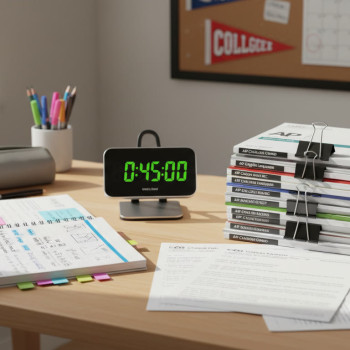Introduction: The AP Crossroads — Seminar or Research?
Somewhere between your sophomore and senior year, a fork in the AP road appears: AP Seminar or AP Research. Both belong to the AP Capstone family, and both promise skills that colleges and employers love — critical reading, rigorous argumentation, disciplined inquiry, and polished presentation. But they’re different animals. One is a bustling, collaborative lab for ideas; the other is a quiet studio for deep, individual scholarship. Choosing the path that fits your personality, goals, and learning style can make the year not just bearable, but exhilarating.

At a Glance: What Each Course Actually Is
AP Seminar — The Team-Based Think Tank
AP Seminar is designed around inquiry and collaboration. You’ll analyze multiple sources, evaluate differing perspectives, and craft evidence-based arguments. Assessments typically include team projects, individual written arguments, multimedia presentations, and an end-of-course exam. It’s a course that trains you to think laterally, synthesize across disciplines, and present convincingly.
AP Research — The Yearlong Independent Project
AP Research is where you take a question and run with it. Prerequisite: Seminar. The core of Research is a student-designed investigation culminating in a 4,000–5,000 word academic thesis and an oral defense. There’s no end-of-course multiple-choice exam; instead you demonstrate your ability to plan, execute, analyze, and communicate original research. It’s less about teamwork and more about scholarly independence.
Who Thrives in AP Seminar?
Seminar is built for people who like conversation and iteration. If you enjoy bouncing ideas off peers, remixing viewpoints, experimenting with multimedia, or working toward a shared product, Seminar will feel like your stadium.
- Students who enjoy collaborative problem solving and group dynamics.
- Those who prefer scaffolded, guided assessments rather than a single long-term project.
- Learners who want to strengthen argumentation, source analysis, and public speaking.
- Students who appreciate variety — different performance tasks and a digital end-of-course exam.
Real-World Fit
Think communications, law, journalism, social sciences, or any career where presenting, negotiating, and synthesizing perspectives are daily tasks. Seminar practice mirrors many real-world team projects and workplace collaborations.
Who Thrives in AP Research?
Research is for deep divers. If you like solitude while you think, relish the process of designing an original study, or are excited by the idea of producing a publishable-style paper in high school, Research is an ideal fit.
- Independent learners who can pace long-term projects.
- Students comfortable with ambiguity — formulating questions, adapting methods when results surprise you.
- Those who want experience with research design, data analysis (qualitative or quantitative), and academic writing.
- Students planning majors that expect research experience (e.g., STEM, social sciences, humanities).
Real-World Fit
Research preps students for undergraduate honors theses, lab research, internships, and any path where you propose, test, and defend original ideas. It’s highly valued by selective colleges because it demonstrates maturity in thought and academic curiosity.
Key Differences — A Practical Comparison
Below is a clear, student-friendly comparison to help you weigh trade-offs.
| Feature | AP Seminar | AP Research |
|---|---|---|
| Primary Mode | Collaborative projects, group presentations, end-of-course digital exam | Independent research project, long-form academic paper, oral defense |
| Best For | Students who work well with peers and enjoy varied assessments | Independent thinkers who want to pursue a sustained research question |
| Assessment | Performance tasks + exam | Portfolio: academic paper + presentation with defense |
| Time Frame | Yearlong with staged tasks | Yearlong single project with iterative milestones |
| Skill Highlights | Argument synthesis, teamwork, multimodal presentation | Research methods, data analysis, academic writing |
Questions to Ask Yourself Before You Choose
Choosing isn’t only about strengths; it’s about fit, goals, and timeline. Ask yourself:
- Do I get energy from group brainstorming or do I prefer quiet, focused work?
- Do I want a portfolio-style capstone or a variety of tasks across a year?
- Will my college major value an independent research project?
- Am I prepared to manage a months-long project with shifting timelines?
How Colleges View Each Course
Colleges generally appreciate both courses, but they signal different things. Seminar shows you can collaborate, think critically across disciplines, and communicate well. Research signals the ability to pursue original scholarship, manage an independent project, and write at a college level. If you’re applying to research-heavy programs (natural sciences, psychology, sociology), Research may carry extra weight. If you’re aiming for interdisciplinary or communication-focused programs, Seminar shines.
Study Strategies That Work for Each
Winning at AP Seminar
- Practice tight, evidence-based writing. Learn to move from claim to evidence to explanation in a paragraph.
- Get comfortable with sources: annotate, summarize, and evaluate credibility quickly.
- Develop presentation habits: time your talks, use visuals sparingly, and rehearse Q&A.
- Sharpen teamwork skills: define roles, set milestones, and schedule regular check-ins.
Winning at AP Research
- Create a research timeline with clear milestones: literature review, methods, data collection, analysis, draft, revision.
- Keep a research log or lab notebook to track decisions, setbacks, and evolving ideas.
- Seek feedback often — from teachers, mentors, or a tutor — and be ready to revise your question or method.
- Practice academic writing: clear thesis, structured sections, and careful citation.
Common Pitfalls and How to Avoid Them
Both courses can be deeply rewarding, but students stumble sometimes. Here are typical issues and practical fixes.
- Procrastination on long-term work: Break tasks into weekly micro-deadlines and celebrate small wins.
- Poor team communication: Use shared docs, calendar invites, and a simple roles chart (researcher, editor, presenter, project manager).
- Overly ambitious research questions: Narrow early. A focused, well-executed small study beats an unfinished grand plan.
- Weak source evaluation: Learn to triage sources quickly — who wrote it, why, when, and how rigorous is the method?
How to Use Seminar to Decide If Research Is for You
AP Seminar is an excellent litmus test. The skill set it develops — formulating questions, evaluating perspectives, writing and presenting evidence-based arguments — is the foundation you’ll need in Research. If you finish Seminar and feel energized by your individual paper, curious about deeper inquiry, and comfortable with long-form argument, Research is a natural next step.
Ways to Get Extra Support (Without Losing Ownership)
Both courses reward smart support. Getting help doesn’t mean shortcuts — it means guidance. Sparkl’s personalized tutoring, for instance, can provide 1-on-1 guidance when you’re stuck on research design, tailor study plans around your school deadlines, or offer expert tutors who give feedback on writing and presentations. That kind of targeted help can accelerate learning while keeping you firmly in charge of your work.
Sample Roadmap: Choosing and Excelling — A Two-Year Plan
If you’re unsure how to schedule Seminar and Research in your high school timeline, here’s a practical two-year roadmap.
| Year | Fall | Spring | Summer |
|---|---|---|---|
| Sophomore/Junior | Enroll in AP Seminar. Learn core skills and try small research questions. | Complete Seminar team project and individual paper. Reflect on interest in deeper research. | Read a few papers in topics you like. Sketch potential research questions. |
| Junior/Senior | Start AP Research if motivated. Draft proposal and literature review. | Collect data, analyze, write drafts, present and defend findings. | Finalize paper, polish presentation skills, prepare portfolio for college applications. |
Examples of Successful Student Projects
Concrete examples make choices easier. Here are a few realistic project snapshots — the kind that have appeared in AP Research portfolios and that show the scope and creativity students achieve:
- Exploring how urban green spaces affect local mental health outcomes using a mix of surveys and GIS mapping.
- Analyzing the rhetoric of climate change articles across conservative and progressive outlets to measure framing differences.
- Designing and testing an intervention to improve study habits among underclassmen and measuring results through pre- and post-assessments.
- Conducting a lab-based experiment on reaction time under varying sleep conditions (with proper safety and supervision).
How to Talk About These Courses on College Applications
Both Seminar and Research make excellent material for applications and interviews — but say different things. For Seminar, emphasize collaboration, evidence-based reasoning, and leadership in group projects. For Research, highlight the originality of your question, the rigor of your methods, the challenges you overcame, and the insights you produced. Concrete outcomes — a strong paper, a poster presentation, or measurable results — give admissions officers clear evidence of capability.
When to Choose Both
If your school schedule allows it, take both. Seminar builds the toolkit; Research lets you use it at scale. Many students find the combination powerful: Seminar trains you to think across sources and perspectives, while Research gives you the chance to produce substantive original work that stands out.

Final Thought: Match the Course to the Version of You You Want to Be
Seminar and Research are more than checkboxes on a transcript. They are workshops for the kinds of thinkers colleges and workplaces need: communicators, investigators, collaborators, and innovators. If you thrive on dialogue and variety, Seminar will refine those muscles. If you crave deep inquiry and the satisfaction of producing an original argument, Research will reward your patience and curiosity.
Practical Next Steps
- Talk to your AP teacher about how the courses are run at your school — some Seminar classes tilt toward humanities, others toward social science or multimedia.
- Read a few student research abstracts (your teacher can help) to see the scale of projects you might undertake.
- Map your workload: can you manage Research’s sustained effort alongside other demanding courses?
- Consider targeted help early: a few Sparkl sessions before a major deadline can clarify research design, refine a thesis, or tighten a presentation — support that keeps the work yours but makes it stronger.
Closing: Which Side of the Fork Will You Take?
There’s no universally right answer. Both AP Seminar and AP Research are intellectually rich and recognized by colleges. The better question is which environment will let you do your best, learn most joyfully, and produce work you’re proud to show. Pick the one that fits your temperament and goals — and remember that taking both, when possible, combines the pragmatic gears of Seminar with the intellectual engine of Research.
Whichever path you choose, approach it with curiosity. Treat your work like practice for college and life: draft boldly, revise diligently, seek feedback, and own the final product. That mindset, more than any single course, is what truly prepares you to thrive.
Good luck — and if you ever want help shaping a research question, polishing a defense, or creating a study schedule that actually works, a few targeted tutoring sessions can make a surprisingly big difference. You don’t have to go it alone.
















No Comments
Leave a comment Cancel